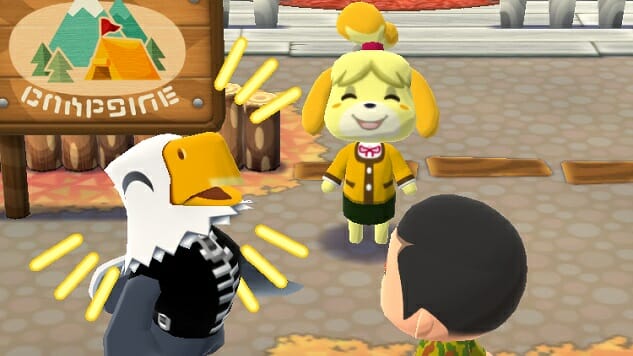
I’ve played almost every Animal Crossing title, and while I’ve always enjoyed the time I spent on each one, none of them have really excited me as much as the new mobile game Pocket Camp has. I didn’t expect to fall for it so hard. A lot of what appears in previous games in the series is also present in Pocket Camp, such as collecting fruits and bugs and home decorating, though this time it’s a campground and a campervan instead of a house. But what pushes Pocket Camp above the other games for me is its sense of community. I don’t feel like it’s just me creating a cool campsite—it’s about pleasing the entire Pocket Camp community, and that feels really nice.
Whereas previous Animal Crossing games focus on living in a small village with a few animal neighbors, Pocket Camp allows players to create their perfect campground. Rather than buying furniture, players must gather materials in order to craft furniture. Animals want to visit your happening campsite, but won’t dare enter without the proper pieces of furniture populating your site. Luckily, once the animal has been invited, players can remove any furniture they want. It’s a little silly to have animals demand you change your campsite, but at least they forget about their requests once they see how cool your camp is.
Talking to villagers has never been my favorite part of these games. I do have my favorite neighbors, but even my most cherished villagers eventually bore me with their requests for a fish or a specific-sized piece of furniture. And while villagers always return the favor by giving players a gift for completing their task, I usually don’t want the things they give me. Sure, sometimes I don’t immediately sell their gifts for extra bells, but my typical Animal Crossing experience largely involves ignoring most of the animals.
All that changes for me in Pocket Camp. In typical Animal Crossing fashion, animals request your services in hunting for food, fish and insects for them. The difference is that the game communicates what exactly players will receive from each animal. Some animals will provide steel, some wood or cotton, which is all needed to construct furniture. Knowing exactly what I get in return for completing an animal’s request really incentivizes me to follow through.
One of the nicest parts about the game is how often animals emphasize all the hard work you’re doing. Once an animal starts to hang out at your campsite, they offer generous gifts, which can range from common items like cotton, to rarer things like cute essence. They want you to keep creating an awesome campsite, and even though they’ve asked you to build furniture you probably didn’t want in the first place, they recognize their inconveniences and pay you back. I feel like the whole community is working towards making the camp into a utopia where they can turn lamps off and on all day, or drink some tea on a couch until they fall asleep.
The biggest complaint I’ve seen about the game is its use of timers and microtransactions. Pocket Camp is free, but there are ways to spend money. Players can purchase Leaf Tickets which can be used as a shortcut. Tired of waiting for furniture to finish or fruit to grow on trees? Use some Leaf Tickets for instant gratification. Purchasing these tickets doesn’t make the game easier, just faster.
There’s no shame in spending some money for a game you enjoy. If you have the means, and you want to do it, do it. No one should judge how you play your games. For me, though, Pocket Camp is a major game of patience. Every Animal Crossing requires waiting. From identifying fossils, to upgrading a house, lots of things require at least a day to complete in previous titles. And every game allows players to cheat by changing the date and time to whatever time you want. The only difference is that fast-forwarding time in previous titles was free, while Pocket Camp may charge you a few dollars for doing that.
But despite the timers and temptation, Pocket Camp reminds me to stay patient, even when shortcuts are all around me. I waited 48 excruciating hours for my half-pipe to be built. A lot of my cool animals were at max friendship, so the stress to increase their max level weighed on my head. I constantly checked my crafts page, hoping somehow the time would move faster. I could have used my Leaf Tickets to speed up the process, but I didn’t, and I’m glad I didn’t. The game was letting me challenge myself: spend some tickets to get my crafts done now,or let the game play on its own time and get rewarded two days later?
Like every Animal Crossing game, I know there will be a point in time where my playtime dwindles and halts. I won’t find this game fun forever, and that’s fine; I’ve always believed that Animal Crossing is a game that’s there when you need it. And even when weeds overcome your garden, roaches infiltrate your home, and villagers recount the last time they saw you, the game never really cares that you left. It’s only happy to see you again.
Shonté Daniels is a poet who occasionally writes about games. Her games writing has appeared in Kill Screen, Motherboard, Waypoint and elsewhere. Her poetry can be seen at Puerto del Sol, Baltimore Review, Phoebe, and others literary journals. Check out Shonte-Daniels.com a full archive, or follow her for sporadic tweeting.